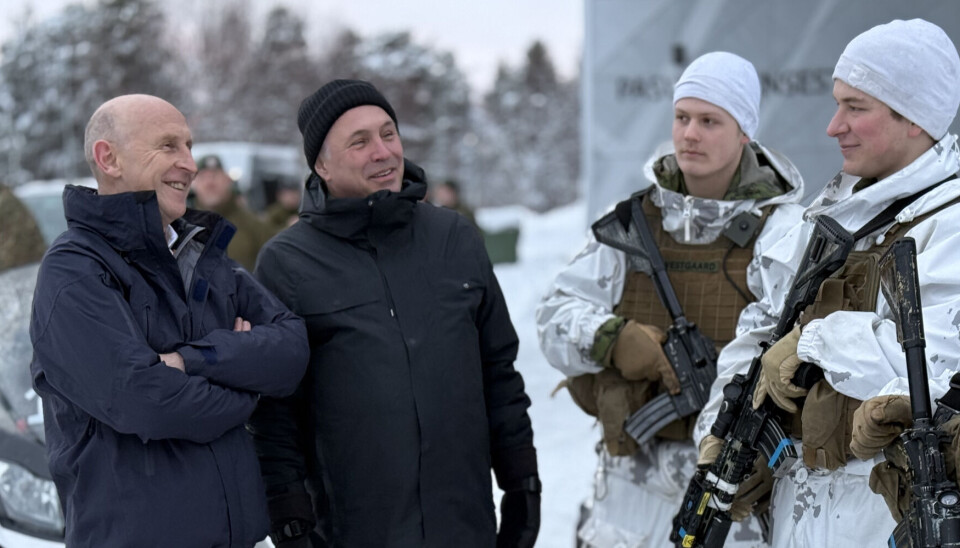Can Europe defend the Arctic without the U.S.?

With shifting power dynamics, rising geopolitical tensions and the return of great-power competition in the High North, the question of whether Europe could defend its own Arctic territory without American support no longer feels hypothetical. As the United States flirts with isolationist rhetoric, threatens to take over allied territories and questions swirl around its long-term commitment to NATO, many European leaders and military experts are reevaluating their own readiness—particularly in the strategically vital Arctic.
Retired U.S. Lieutenant General Ben Hodges, former commanding general of U.S. Army Europe, told Arctic Today that more than a question resources, the future of European defense was political.
“Of course Europe is capable [of defending itself], but it has to summon the political will,” he said. “Everybody knows Russia is a bad guy. And for years I’ve been hearing we need to step up without anybody stepping up.”
Hodges claimed that defending the European Arctic—especially countries like Norway, Sweden, and Finland—without the United States would be difficult, but not impossible.
“The military capabilities exist,” he said. “What lacks is not capability, but political will. Nations like Norway are wealthy enough to do much more, but have chosen not to. That’s not a resource problem—that’s a choice.”
He warned that the deterrent power of NATO, particularly Article 5, has traditionally relied not just on its legal structure but on the perception of unity and certainty. Hodges claims that the real danger lies in the erosion of NATO’s deterrent credibility.
“There never was a question about whether any country would live up to [Article 5]… Now there’s a question.”
That doubt has grown exponentially in recent months. On February 17, at the 2025 Munich Security Conference, U.S. vice president JD Vance openly questioned the sustainability of America’s military role in Europe, casting it as a strategic overreach incompatible with U.S. domestic priorities. Vance’s remarks sent ripples through European defense circles, reinforcing a sense that bipartisan consensus in Washington on transatlantic security can no longer be taken for granted.

New threats and new alliances
In terms of the threats facing the region, Hodges’ concern isn’t only about Russia’s overt aggression but also about its hybrid tactics—sabotage, cyberattacks and pressure on undersea infrastructure. These tactics have already intensified in the Arctic and the Baltic regions and could escalate if Moscow senses a weakened or divided NATO.
Dr. Paal Sigurd Hilde, Professor of War Studies at the Norwegian Defence University College, agrees that the Arctic could become a serious vulnerability for Europe if U.S. support fades. But he is more cautious in his assessment of Europe’s independent capabilities.
“Will European countries be able to defend Finland, Sweden and Norway without U.S. support? In my eyes yes, if the UK and Germany and others contribute, but with much more difficulty and greater losses,” Hilde said.
However, he cautioned that defending remote and symbolically important areas like Svalbard without American assistance would likely be beyond Europe’s current capacity.
Europe’s readiness gaps are not just theoretical. Hilde pointed to strategic airlift, long-range strike capability and intelligence assets as areas where Europe remains heavily reliant on U.S. support. Even in terms of basic infrastructure, he noted that road and rail connectivity across Scandinavia remains insufficient for a high-speed military response.
Nevertheless, Hodges believes the current geopolitical moment could be a turning point.
“It’s a shame that Europe needs the United States to remind it to live up to its treaty obligations,” he said, “but if this is what it takes to get countries to finally act, then maybe it’s for the better in the long term.”
Signs of this shift are beginning to appear. In early 2025, the United Kingdom and Norway announced plans for a new defense agreement focused on the High North, aimed at enhancing joint operations, intelligence-sharing, and protection of undersea infrastructure. For Hodges, the UK stands out as the European country most likely to step into a greater leadership role.

“There is more than enough combat power and potential in the region,” he said. “The problem has always been coordination and commitment.”
When it comes to nuclear deterrence, both men agreed that France and the UK are the only real options for Europe if the U.S. steps back, however, how that nuclear umbrella would be implemented remains up in the air.
“How far the UK is willing to go alone in offering what is called extended nuclear deterrence to the Northern European countries is not clear,” Hilde said. “France has talked about offering this to other European countries, but as far as I know, not been clear on details of what this will involve or how it would work. Few seem to be keen on taking up the French idea.”
Still, creating an effective European-led defense framework for the Arctic remains a tall order. Hilde doesn’t believe that existing regional alliances like Nordefco could evolve into a serious substitute for NATO, but he sees potential in a broader Northern European bloc.
“My bet would be on the Northern European countries coming together in some kind of ‘mini-NATO’ in the north… the Nordic countries, the Baltic, Poland, Germany, BeNeLux and the United Kingdom,” he said.

Ultimately, the central question isn’t whether Europe can defend the Arctic without the U.S.—it’s whether it will. For Hodges, the time to stop hoping for guarantees and start building credible alternatives is now.
“Deterrence requires capability and credibility,” he said. “The credibility part comes from showing that you’re serious.”